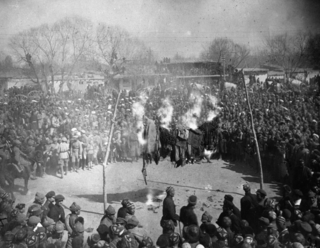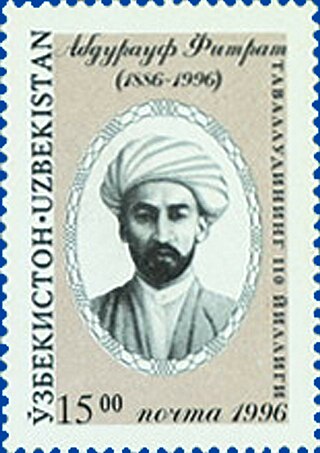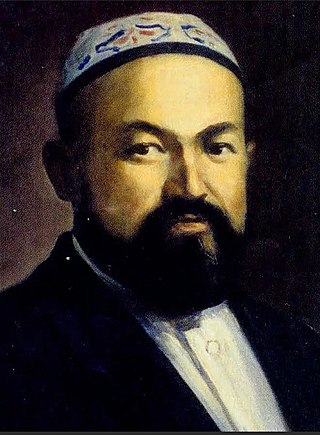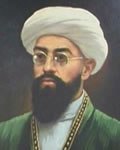Related Research Articles

Islam is the dominant religion in Uzbekistan. Islamic customs were broadly adopted by the ruling elite, and they began patronage of scholars and conquerors such as Muhammad al-Bukhari, Al-Tirmidhi, Ismail Samani, al-Biruni, Avicenna, Tamerlane, Ulugh Begh, and Babur. Despite its predominance and history, the practice of Islam has been far from monolithic since the establishment of the Uzbek Soviet Socialist Republic. Many versions of the faith have been practiced in today's Republic of Uzbekistan. Most of them stray far from conventional Islamic tradition and law, and practice a far more relaxed approach. Heavily authoritarian interpretations of the Qur’an, including Shariah Law, as seen in parts of the Middle East, are almost unheard of in Uzbekistan. There are also traditions from the Zoroastrian era which are still practiced, before the introduction of Islam to the country.

Russian Turkestan was the western part of Turkestan within the Russian Empire’s Central Asian territories, and was administered as a Krai or Governor-Generalship. It comprised the oasis region to the south of the Kazakh Steppe, but not the protectorates of the Emirate of Bukhara and the Khanate of Khiva. It was populated by speakers of Russian, Uzbek, Kazakh, Kyrgyz, and Tajik.
The Jadids were a political, religious, and cultural movement of Muslim modernist reformers within the Russian Empire in the late 19th and early 20th century. They normally referred to themselves by the Turkic terms Taraqqiparvarlar ("progressives"), Ziyalilar ("intellectuals"), or simply Yäşlär/Yoshlar ("youth"). The Jadid movement advocated for an Islamic social and cultural reformation through the revival of pristine Islamic beliefs and teachings, while simultaneously engaging with modernity. Jadids maintained that Turks in Tsarist Russia had entered a period of moral and societal decay that could only be rectified by the acquisition of a new kind of knowledge and modernist, European-modeled cultural reform.

Hujum refers to a broad campaign undertaken by the Communist Party of the Soviet Union to remove all manifestations of gender inequality within the Union Republics of Central Asia. Beginning in the Stalinist era, it particularly targeted prevalent practices among Muslims, such as female seclusion from society and female veiling practices. While it was often symbolized by the burning of the veils that Muslim women wore, the removal of veiling practices was not the campaign's sole goal. The Party began re-emphasizing their message of women's liberation within class consciousness. By abolishing Central Asian societal norms and heralding in women's liberation, the Soviets believed they could clear the way for the construction of socialism. The campaign's purpose was to rapidly change the lives of women in Muslim societies so that they would be able to actively participate in public life, formal employment, education, and ultimately membership in the Communist Party. It was originally conceived to enforce laws that gave equality to women in patriarchal societies by creating literacy programs and bringing women into the workforce.
Devin Deweese is a professor of Islamic and Central Eurasian Studies at Indiana University Bloomington, Indiana.

Islam in Central Asia has existed since the beginning of Islamic history. Sunni branch of Islam is the most widely practiced religion in Central Asia. Shiism of Imami and Ismaili denominations predominating in the Pamir plateau and the western Tian Shan mountains, while boasting to a large minority population in the Zarafshan river valley, from Samarkand to Bukhara. Islam came to Central Asia in the early part of the 8th century as part of the Muslim conquest of the region. Many well-known Islamic scientists and philosophers came from Central Asia, and several major Muslim empires, including the Timurid Empire and the Mughal Empire, originated in Central Asia. In the 20th century, severe restrictions on religious practice were enacted by the Soviet Union in Soviet Central Asia and the People's Republic of China in Xinjiang.

Hamza Hakimzade Niyazi was an Uzbek author, composer, playwright, poet, scholar, teacher, and political activist. Niyazi is widely seen as one of the leading figures in the early development of modern Uzbek literary tradition. He is generally considered the first Uzbek playwright, the founder of modern Uzbek musical forms, as well as the founder of Uzbek social realism. During the Russian Revolution, he strongly supported the Bolsheviks, as they strongly opposed the system of feudal rule that was prevalent in much of Central Asia. He was one of the first Uzbeks to join the Communist Party and dedicated his life to promoting literacy and education in his homeland, opening schools and orphanages.

Ronald Grigor Suny is an American-Armenian historian and political scientist. Suny is the William H. Sewell Jr. Distinguished University Professor of History Emeritus at the University of Michigan and served as director of the Eisenberg Institute for Historical Studies, 2009 to 2012 and was the Charles Tilly Collegiate Professor of Social and Political History at the University of Michigan from 2005 to 2015, William H. Sewell Jr. Distinguished University Professor of History (2015–2022), and is Emeritus Professor of political science and history at the University of Chicago.
The Communist Party of Turkestan was a branch of the Russian Communist Party (Bolsheviks) which operated in the Turkestan Autonomous Soviet Socialist Republic. It was formed in June 1918. At the time of its formation, the party was joined by a large section of Jadids.

The Spiritual Administration of the Muslims of Central Asia and Kazakhstan (SADUM) (Russian: Духовное управление мусульман Средней Азии и Казахстана (САДУМ); Uzbek: Ўрта Осиё ва Қозоғистон мусулмонлари диний бошқармаси) was the official governing body for Islamic activities in the five Central Asian republics of the Soviet Union. Under strict state control, SADUM was charged with training clergy and publishing spiritual materials, among other tasks. The organization was headquartered in Tashkent, Uzbekistan. Established in 1943, SADUM existed for nearly 50 years. With the dissolution of the Soviet Union, the five newly independent republics reformed their respective branches of SADUM into their own national Islamic institutions.

Abdurauf Fitrat was an Uzbek author, journalist, politician and public intellectual in Central Asia under Russian and Soviet rule.

Transoxiana or Transoxania is the Latin name for the region and civilization located in lower Central Asia roughly corresponding to modern-day eastern Uzbekistan, western Tajikistan, parts of southern Kazakhstan, parts of Turkmenistan and southern Kyrgyzstan. The name was first coined by Alexander the Great in the 4th century BC when Alexander's troops were able to conquer the region. The region may have had a similar Greek name in the days of Alexander the Great, but the earlier Greek name is no longer known. Geographically, it is the region between the rivers Amu Darya to its south and the Syr Darya to its north.

Munawwar Qari Abdurrashidkhan ogli was a leading Jadidist of late Tsarist-era Turkestan. Like other Jadids, Munnawwar Qari worked as author, poet, teacher, journalist and in other occupations.

Mahkmudkhodja Behbudiy was a Jadid activist, writer, journalist and leading public figure in Imperial Russian and Soviet Turkestan.
Jamsheed K. Choksy is a Distinguished Professor, former Chair of the Department of Near Eastern Languages and Cultures, former Chair of the Department of Central Eurasian Studies, and current Director of the Inner Asian and Uralic National Resource Center at Indiana University - Bloomington. Choksy completed his undergraduate degree from Columbia University in 1985 and doctoral work at Harvard University in 1991 where he was elected a Junior Fellow (1987-1991). From there, he embarked on a career in academia, beginning as a Visiting Assistant Professor at Stanford University (1991-1993) and subsequently a tenure track professor at Indiana University in 1993, eventually holding appointments in a variety of different programs in that university. He has been a NEH Fellow and Member at the School of Historical Studies, Institute for Advanced Study in Princeton (1993-1994), a Guggenheim Fellow (1996), a Mellon Fellow at the Center for Advanced Study in the Behavioral Sciences, Palo Alto (2001-2002), and a Phi Beta Kappa Visiting Scholar (2018-2019).
Muhammadjan Hindustani was an Islamist teacher in Uzbekistan during the Soviet era. He was a teacher of Abduvali qori Mirzayev, who taught Tahir Yuldash and Juma Namangani. Yuldash and Namangani both became leaders of the Islamic Movement of Uzbekistan. Sayid Abdullah Nuri and Muhammad Sharif Himmatzoda, who were leaders of the Islamic Renaissance Party of Tajikistan were also students of Hindustani's. Hindustani was arrested by the Soviets, and he died in prison.
Zsuzsanna Gulácsi is a Hungarian-born American historian, art historian of pan-Asiatic religions. She is a professor of art history, Asian studies, and comparative religious studies at Northern Arizona University (NAU). Her teaching covers Early and Eastern Christian art, Islamic art, with special attention to the medium of the illuminated book; as well as late ancient and mediaeval Buddhist art from South, Central, and East Asia.

The Politics of Muslim Cultural Reform: Jadidism in Central Asia is a 1998 book by Adeeb Khalid, published by the University of California Press. The work is part of the Comparative Studies on Muslim Societies series.

This is a select bibliography of English language books and journal articles about the history of Central Asia. A brief selection of English translations of primary sources is included. Book entries have references to journal articles and reviews about them when helpful. Additional bibliographies can be found in many of the book-length works listed below; see Further reading for several book and chapter-length bibliographies.

Oyina was a bilingual Turki-Persian newspaper published from Samarkand, Russian Turkestan 1913-1915. The newspaper was published by Mahmudkhodja Behbudiy. It functioned as an organ of the Jadid social reform movement.
References
- 1 2 3 4 "Google Scholar".
- 1 2 "Carleton Site Search | Carleton College".
- 1 2 3 Adeeb Khalid CV. 1986 - present. July 2022.